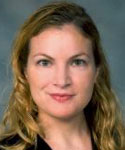Bioengineer studies brain’s response to hypoxia, cell-level treatments
At one point during her first Rice career, Amina Qutub turned her attention from the chemistry of oil to the mysteries of the brain – and she liked what she saw.
Now a bioengineer at Rice, Qutub ’99 is working to understand processes inside the brain using methods that bridge the gap between computational biology and clinical application. Her research may lead to new treatments for victims of stroke and neurodegenerative diseases.
Qutub, an assistant professor of bioengineering based at Rice’s BioScience Research Collaborative , is the recipient of a prestigious CAREER Award, given by the National Science Foundation to early-career researchers poised to make a significant impact in their disciplines.
She thanked colleague Antonios Mikos for encouraging her toward what has become a stimulating career. “I was a chemical engineering undergraduate at Rice, studying process control as it applied to oil but reading about neurobiology in my free time. I wanted to better understand the mechanisms of Alzheimer’s — which is what my grandmother was suffering from,” Qutub said. “Tony Mikos taught the first course I took in bioengineering. He connected me to a lab at MD Anderson (Cancer Center) looking at treatments for neurodegenerative diseases. One of the main hurdles to treatment is the brain’s blood supply — the blood-brain barrier — and this became my focus in graduate school.”
“I remember Amina from her time as an undergraduate,” said Mikos, Rice’s Louis Calder Professor of Bioengineering and Chemical and Biomolecular Engineering. “She impressed me as a truly exceptional and ambitious student with a keen interest in bridging concepts from one subject to another. Those same qualities are clearly reflected in the success of her current interdisciplinary research program.
“Her research presents the potential to have a tremendous impact in a variety of fields, ranging from regenerative medicine to drug development. I am thrilled for Amina and congratulate her for this wonderful recognition,” Mikos said.
Qutub returned to Rice three years ago after earning her doctorate at the University of California, Berkeley/UCSF and serving a fellowship at The Johns Hopkins University. Her research progressed from work to understand the blood-brain barrier to a focus on the way the body responds to hypoxia (or lack of oxygen). Combined with her computational background, she’s uniquely positioned to look at the way brain cells behave when they lack oxygen, such as after strokes or during neurodegeneration.
The CAREER grant will further her research on microvasculature formation in the brain. “We want to know what makes cells more responsive so they can be more viable under hypoxic conditions and — in the case of a stroke, for instance — to regrow areas of the brain.”
To do so will require a fine understanding of the way single cells and neurons in the brain behave in response to their environment. She said her group is “harnessing methods from computer science and genetic engineering to design algorithms that rapidly compare different hypotheses about cell behavior to what we see in the lab.”
The goal is to know how cells process information and to learn to direct how they make decisions, especially under stressful conditions like hypoxia, Qutub said. “We want to be able to predict individual cell behavior: migration, branching, proliferation, elongation. What we want to do then is tie that cell’s behavior to what’s happening inside the cell.
“Once we better understand the cell machinery, the eventual goal is to program the behavior of human endothelial cells and neurons,” she said.
Being one of the first researchers to take up residence in the BRC when it opened three years ago is akin to having a front-row seat for cutting-edge bioscience, she said.
“I gave a talk to high school students on Saturday and told them this is one of the most exciting buildings in the world,” said Qutub, who is also collaborating with Texas Medical Center researchers on leukemia and brain cancer projects. “This place brings together systems engineers with biochemists, physicists, clinicians, imaging specialists, tissue engineers, synthetic biologists and computer scientists, and this type of infrastructure really breeds innovation.”



Leave a Reply